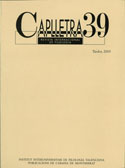Del present imperfecte i dels futurs de probabilitat, o entorn de la filologia, la lingüística, l'anàlisi crítica del discurs i les ciències de la comunicació
DOI:
https://doi.org/10.7203/caplletra.39.4854Palabras clave:
philology, linguistics, communication sciences, critical discourse analysis Resumen
Resumen
What is the aim today of talking about philology, either in absolute terms or related to other concepts such as linguistics or language sciences? On the one hand, it seems unfair to resort to metaphors that pair (traditional) philology and (textual) necrophilia. On the other hand, turning our back on the reality is not the appropriate response to current problems: a more applied training (in the professional field) is
needed, and (in the scientific context) the frontiers should be pushed back, because the old ones are obsolete and in need of reappraisal. Faced with a past and a present that are inevitably imperfect, this article is a reflection on the chances of a future in which philology (in the classical sense) is accompanied by language and communication sciences. The reason for this situation and for this specific proposal is not simply to follow the fashion or to embrace modernity, as the winner of the debate with antiquity: the aim is to try to provide a fuller professional training (a less erudite one) and a more interdisciplinary, less localist area of study.
The context of the article is provided by comment on a brief series of sociopolitical and cultural events in our setting, all of them previous to the elections to the Parliament of Catalonia in November 2006. Any analysis of events of this kind, even
the most superficial, shows that philologists or linguists should not undervalue a critical competence which, in its turn, should be transmitted to students as one of the skills involved in the processes of teaching, learning and knowledge transfer.
Instead of limiting itself to the fields of grammar and history of literature, an imaginative (not imaginary) philology need to be open to criticism and communication. If the natural epistemological context of philology (of any philology) is also that of communication, we should not object to the efforts to strengthen the lines of convergence rather than divergence and contrast. Can a philology without communication produce
anything but unemployable professionals? A clever (indirect) answer: although we may only be a fully-fledged nation in the preamble (not in the text) we should try hard to rescue our philology from the twilight zone.
 Descargas
Descargas
Descargas
Publicado
Cómo citar
-
Resumen541
-
PDF (Català)126
Número
Sección
Licencia
El autor o autora que dirija un trabajo a la redacción de Caplletra para ser publicado tiene que ser la persona titular legítima de los derechos de explotación. La legitimación para la publicación del trabajo tiene que incluir también las imágenes, las tablas, los gráficos y otros materiales que puedan complementar el texto, con independencia de si es su autor o autora.
Copyright. Al publicar el trabajo en la revista, el autor o autora cede a Caplletra. Revista Internacional de Filologia los derechos de explotación (reproducción, distribución y comunicación pública), tanto para la edición impresa en papel como para la versión electrónica.
Todos los trabajos publicados en Caplletra se encuentran bajo una licencia Creative Commons del tipo Reconocimiento-NoComercial-SinObraDerivada 4.0.
RESPONSABILIDAD
Caplletra. Revista Internacional de Filologia no se identifica necesariamente con los puntos de vista sostenidos en los trabajos que publica.Caplletra. Revista Internacional de Filologia declina toda responsabilidad derivada de cualquier vulneración eventual de los derechos de propiedad intelectual que pudiera ser llevada a cabo por los autores o autoras.






